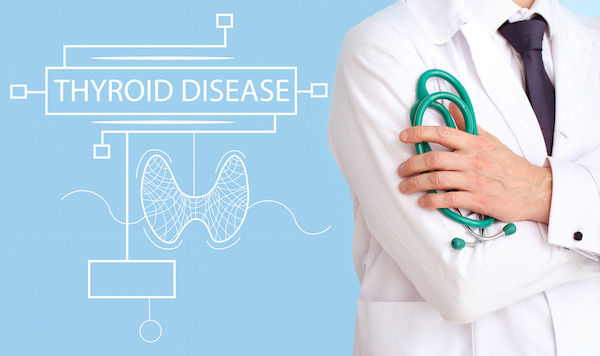Is Thyroid Disease Hereditary?
Know all if thyroid is genetic, what are common symptoms and how to manage the thyroid health.

Written by
Last updated on 21st Jul, 2025

Introduction
Thyroid disease affects millions of people worldwide, and if you or a family member has been diagnosed with it, you might wonder—is thyroid disease hereditary? The answer isn’t straightforward, but genetics do play a role. In this article, we’ll explore the connection between thyroid disorders and heredity, common symptoms, causes, and ways to manage thyroid health.
Understanding Thyroid Disease
The thyroid is a small, butterfly-shaped gland in your neck that produces hormones regulating metabolism, energy levels, and overall body function. When the thyroid isn’t working properly, it can lead to:
- Hypothyroidism
Too little hormone production causes fatigue, weight gain, and depression. - Hyperthyroidism (overactive thyroid
Excessive hormone production, leading to weight loss, anxiety, and rapid heartbeat. - Thyroid nodules or goitre
Enlargement or lumps in the thyroid. - Autoimmune thyroid disorders
Such as Hashimoto’s disease and Graves’ disease.
Is Thyroid Disease Passed Down in Families?
Yes, thyroid disorders can run in families, but inheritance isn’t guaranteed. Here’s what the research suggests:
1. Genetic Predisposition
- If a close family member (parent, sibling) has thyroid disease, your risk increases.
- Autoimmune thyroid diseases (Hashimoto’s and Graves’) have a stronger genetic link.
- Certain gene mutations may make you more susceptible.
2. Environmental Triggers Matter Too
Even with a genetic risk, other factors contribute, such as:
- Iodine deficiency or excess (affects thyroid function).
- Stress and hormonal changes (pregnancy, menopause).
- Exposure to radiation especially in childhood.
- Certain medications or infections.
So, while you may inherit a tendency for thyroid problems, lifestyle and environment also play a big role.
Common Symptoms of Thyroid Disease
Since thyroid disorders develop slowly, symptoms are often mistaken for stress or ageing. Watch for:
Hypothyroidism
- Fatigue and sluggishness
- Unexplained weight gain
- Feeling cold often
- Dry skin and hair loss
- Depression or brain fog
Hyperthyroidism
- Rapid weight loss
- Anxiety, irritability
- Fast or irregular heartbeat
- Sweating and heat intolerance
- Tremors in hands
If you notice these signs—especially if thyroid disease runs in your family—consult a doctor.
Consult Top endocrinologist for Personalised Advice
How to Manage Thyroid Health?
While you can’t change your genes, you can take steps to support thyroid function:
1. Get Regular Check-ups
- If thyroid disease is in your family, periodic thyroid function tests (TSH, T3, T4) can help detect issues early.
2. Eat a Thyroid-Friendly Diet
- Iodine-rich foods like seafood, dairy, iodized salt should be consumed but avoid excess.
- Selenium & zinc rich foods like nuts, eggs, legumes support hormone production.
- Avoid processed foods & excess soy as it can interfere with thyroid function.
3. Manage Stress
- Chronic stress can worsen thyroid disorders. Try yoga, meditation, or deep breathing.
4. Exercise Regularly
- Helps regulate metabolism and energy levels.
5. Avoid Smoking & Limit Alcohol
- Both can negatively impact thyroid function.
When to See a Doctor?
If you have a family history of thyroid disease or experience symptoms, consider:
- Thyroid blood tests (TSH, Free T3, Free T4, antibodies).
- Ultrasound (if nodules or swelling are present).
- Early detection and treatment can prevent complications like heart disease, infertility, or severe fatigue.
Final Thoughts
Thyroid disease can be hereditary, but it’s not inevitable. If it runs in your family, staying proactive with check-ups and a healthy lifestyle can make a big difference.
Need a thyroid test or expert advice?
You can easily book a thyroid function test or consult an endocrinologist through Apollo 24|7. Early detection helps in better management!
Consult Top endocrinologist for Personalised Advice
Consult Top endocrinologist for Personalised Advice

Dr. Nithin Reddy Modhugu
Endocrinologist
6 Years • MBBS, MD (General Medicine), DNB (Endocrinology)
Hyderabad
Dr. Nithin's Endocrine Clinic, Hyderabad
(100+ Patients)

Dr. Gayatri S
Endocrinologist
4 Years • Suggested Qualifictaion- MBBS, MD (Internal Medicine), DM (ENDOCRINOLOGY)
Nellore
Narayana hospital, Nellore

Dr. Shiva Madan
Endocrinologist
10 Years • MBBS , MD (General medicine) , DM (Endocrinology)
Bikaner
Sushma diabetes and Endocrine center, Bikaner

Dr. Venkata Rakesh Chintala
Endocrinologist
8 Years • MBBS,MD( GEN MEDICINE), DM ( ENDOCRINOLOGY)
Krishna district
Sanjeevani Hospital, Krishna district

Dr. Arunava Ghosh
General Physician/ Internal Medicine Specialist
9 Years • MBBS,MD(GENL.MED.),DM(ENDOCRINOLOGY)
Kolkata
VDC Clinic, Kolkata
Consult Top endocrinologist for Personalised Advice

Dr. Nithin Reddy Modhugu
Endocrinologist
6 Years • MBBS, MD (General Medicine), DNB (Endocrinology)
Hyderabad
Dr. Nithin's Endocrine Clinic, Hyderabad
(100+ Patients)

Dr. Gayatri S
Endocrinologist
4 Years • Suggested Qualifictaion- MBBS, MD (Internal Medicine), DM (ENDOCRINOLOGY)
Nellore
Narayana hospital, Nellore

Dr. Shiva Madan
Endocrinologist
10 Years • MBBS , MD (General medicine) , DM (Endocrinology)
Bikaner
Sushma diabetes and Endocrine center, Bikaner

Dr. Venkata Rakesh Chintala
Endocrinologist
8 Years • MBBS,MD( GEN MEDICINE), DM ( ENDOCRINOLOGY)
Krishna district
Sanjeevani Hospital, Krishna district

Dr. Arunava Ghosh
General Physician/ Internal Medicine Specialist
9 Years • MBBS,MD(GENL.MED.),DM(ENDOCRINOLOGY)
Kolkata
VDC Clinic, Kolkata
